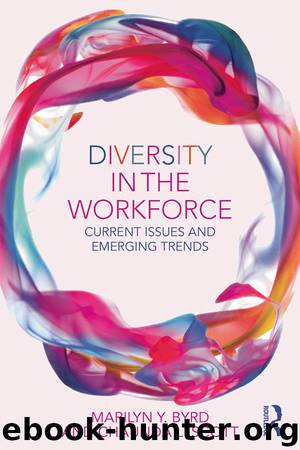Diversity in the Workforce by Unknown

Author:Unknown
Language: eng
Format: epub
ISBN: 9781135122874
Publisher: Taylor and Francis
Chapter Summary
This chapter presented the economic structure of social class in America and discussed some of the salient features of American social class structure. The chapter then discussed noneconomic perspectives of social class and ways individuals can experience disadvantage or privilege based on their perceived social class affiliation. The chapter concluded with emerging perspectives of social class and the workforce.
Definition of Key Terms
Classism—The institutional, cultural, and individual set of practices and beliefs that assign differential value to people according to their socioeconomic class; and an economic system that creates excessive inequality and causes basic human needs to go unmet (Leondar-Wright & Yeskel, 2007, Appendix 13).
Good ol’ boy network—Social networking system that allows bias and prejudice to linger and endure and as a result creates a social stratification usually across forms of difference.
Life chances—The better (or worse) chances in life a person has depending on the person’s social class, lifestyle, life expectancy, health, education, marital happiness, and so on (Sernau, 2001).
Lower classes—Consists of the working poor and the unemployed underclass.
Majority classes—Consist of a lower middle class and a working class.
Power—The ability for an individual in a social relationship to achieve his or her will regardless of resistance by others (Weber, 1968).
Privilege—The “rights, benefits, and advantages automatically received by being a member of the dominant group regardless of intentions” (Sensoy & DiAngelo, 2009, p. 348).
Privileged classes—The upper class, which consist of the rich and powerful, and the upper-middle class, which consists of educated and wealthy professionals.
Second-class citizen syndrome—Refers to feelings of inferiority or experiencing feelings of inadequacy or “not living up” to the standards of others in the group.
Social class—One’s economic position in society. Historically, social class has represented a socioeconomic social stratification that is measured in terms of education, occupation, wealth, and income.
Social groups—Groups of people that share physical, cultural, or social characteristics that typically target them for social oppression, and experiences of disadvantage, marginalization, and subordination (e.g., racial, ethnic, immigrant, gender, and even emerging categories such as disabilities) (Hardiman, Jackson, & Griffin, 2007).
Social oppression—Perpetuates the belief that some social groups are superior or normal and establishes systems of advantage and privilege for these groups while simultaneously defining other social groups as inferior and deserving of disenfranchisement, exploitation, and marginalization (Hardiman, Jackson, & Griffin, 2007, p. 37).
Social stratification—The process by which resources are distributed in society (Beeghley, 2005).
Status—A “subjective phenomenon, a sentiment in people’s minds … members of a status group generally think of themselves as a social community, with a common lifestyle” (Gilbert, 2008, p. 8).
Working military class—The poorer background of many veterans hoping for better opportunity in the military; warriors who come primarily from rural America and our country’s inner cities (Glantz, 2009, p. 70).
Download
This site does not store any files on its server. We only index and link to content provided by other sites. Please contact the content providers to delete copyright contents if any and email us, we'll remove relevant links or contents immediately.
Tools of Titans by Timothy Ferriss(8402)
Change Your Questions, Change Your Life by Marilee Adams(7786)
Deep Work by Cal Newport(7089)
Playing to Win_ How Strategy Really Works by A.G. Lafley & Roger L. Martin(6316)
Man-made Catastrophes and Risk Information Concealment by Dmitry Chernov & Didier Sornette(6022)
Big Magic: Creative Living Beyond Fear by Elizabeth Gilbert(5778)
Digital Minimalism by Cal Newport;(5767)
Ego Is the Enemy by Ryan Holiday(5453)
The Slight Edge by Jeff Olson(5420)
The Motivation Myth by Jeff Haden(5214)
The Laws of Human Nature by Robert Greene(5213)
Stone's Rules by Roger Stone(5089)
Tuesdays with Morrie by Mitch Albom(4788)
Eat That Frog! by Brian Tracy(4543)
Rising Strong by Brene Brown(4465)
Skin in the Game by Nassim Nicholas Taleb(4253)
The Money Culture by Michael Lewis(4211)
Bullshit Jobs by David Graeber(4195)
Skin in the Game: Hidden Asymmetries in Daily Life by Nassim Nicholas Taleb(4009)
